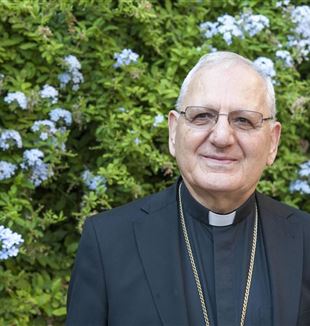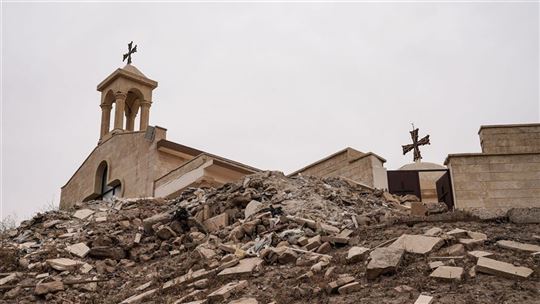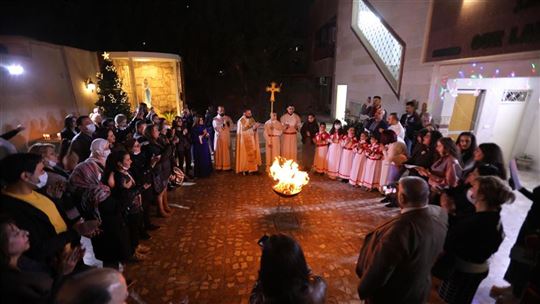
Middle East: "How much light does that little light emanate"
A troubled history still today, victims of humiliation and persecution. But which hides no signs of peace, dialogue and hope, while the nearby Holy Land burns. Chaldean Cardinal Sako talks about the Christian presence in Kurdistan and Iraq.The conflict in the Holy Land has also put the spotlight back on the dwindling presence of Christians in the Middle East. Forced to abandon their lands because of discrimination, wars and terrorism, very few now choose to remain. But some do stay. And they do not stay for lack of alternatives, but "out of love". This is recounted by Cardinal Raphael Louis Sako, Patriarch of the Chaldean Church. He himself, who in recent months has been suffering infamous persecution in Iraq (last July, the Head of State, Abdul Latif Rashid, revoked the historic decree that recognised the Cardinal as the leader of the Iraqi Church and administrator of ecclesiastical property) has decided to move from Baghdad to Erbil, in Iraqi Kurdistan, in order to remain close to the approximately half a million Christians who still inhabit the country.
"In the midst of difficulty, ours is a living, dynamic Church, where participation in Mass and loyalty to the Eucharist are moving. And Christians here live a great service of charity towards all, including Muslims. With this love we look forward to Christmas, which for us will be a bare, essential celebration, without triumphalism due to the situation we are living. But the Child Jesus will always be at the centre.” Talking about himself, the Cardinal does not shy away from personal questions. And so when we ask him what he wishes for this Advent, he answers, "I ask Jesus to live first of all a waiting based on hope. Advent is a journey, a time that I will use to pray to this Child. His birth is a gift for all, but every year I must rediscover Him, listen to Him again, love Him again. Prayer is a necessary condition for hope: if I wait, I experience an inner dynamism that makes me ask, makes me get down on my knees."
He also prays for the communities entrusted to his care, in a country where the economic situation is fragile and where attacks against Christians are a daily occurrence: from exclusion from work to the appropriation of their property, to the systematic demographic change of their cities in the Nineveh Plain (the area historically inhabited by Christian communities). First, the massacre in the Cathedral of Our Lady in Baghdad in 2010, four years after the arrival of Isis, with the killing and exodus of hundreds of thousands of Christians. Then political instability, pro-Iranian brigades discriminating against non-Muslims, the terrible fire in Qaraqosh that just two months ago killed over a hundred Christians at a wedding, and finally the rekindling of tensions between Israelis and Palestinians with repercussions throughout the region.
"I understand many Christian families who decide to leave Iraq and the Middle East to seek a better future for themselves and their children. But I look with hope at the tenacity with which so many others have stayed, I think back to the words of the Pope who wanted to come to Iraq to remind us that we are all brothers. Today we suffer but we have a vocation here. We are not born by chance in Iraq, Syria, Lebanon or the Holy Land: we are called to be missionaries by our Baptism. This was a central point of the Synod that just ended: every baptised person must fully live his or her faith in order to transmit it to the world. We, the Christians of the Middle East, bear witness to fraternity to all by our presence. Our small Christian communities are the salt of the earth: we are infinitely small, we are like candles. But if there is darkness, how much light can even a small lamp emanate! This is possible through very concrete things: for example, a dialogue committee has been set up between Christians, Shias, Sunnis, Yazidis in Iraq, and throughout the Middle East region Christian communities are engaged in education, culture, charity to live in faithfulness, peace, forgiveness. Ours is a fruitful faith. Our task is to prepare ground for the future, for the people of tomorrow. Because wars will end, peace will come, and we will need free men and women to rebuild."
For this reason, for the Cardinal the recent Synod was "a moment of great grace" so much so that in one of his last homilies he found himself wishing the Muslim world to experience such an open and passionate dialogue. "I hope that Muslims too can experience true synodality, to discover the beauty of their faith. I think they need to engage more with the problems of modernity, to face uncomfortable topics such as exegesis or the interpretation of the Koran. The Muslim religious authorities have to do something because there is a closed and inflexible mentality. If something interesting is not offered, where will a young person go to look?".
Read also - The cornerstones of the Synod
To experience unity and try to get out of the wars that cyclically upset Middle Eastern countries, for the Cardinal there is no other way than "a profound and radical conversion of the heart. And we must also have the courage to open up to those who are different. From unity comes a fruitfulness that then infects politics, society. This is also true among us Christians, who sometimes get lost in our affairs. Mind you, when I speak of unity I do not mean uniformity. It is good to have different liturgies, different languages, different traditions, but at the centre we must not forget that there is Christ. Christ – Christmas teaches us – is what the world is waiting for.”